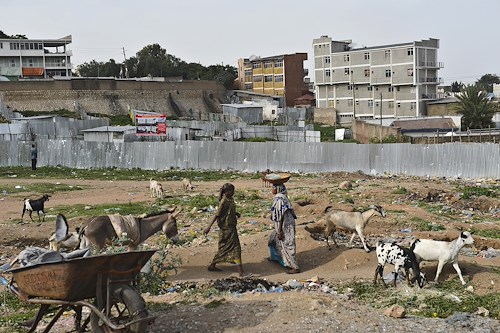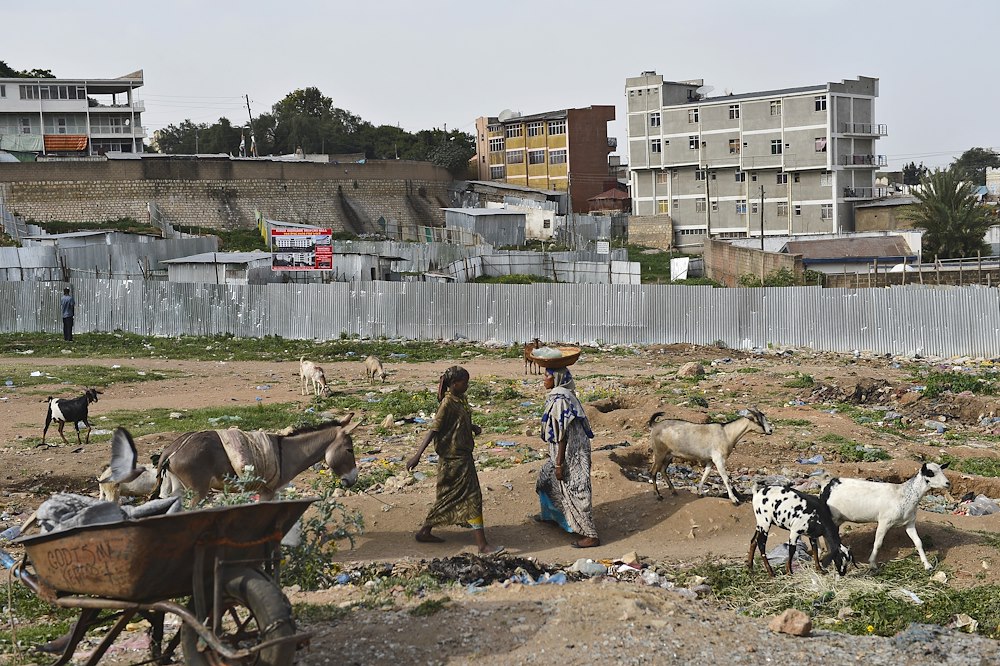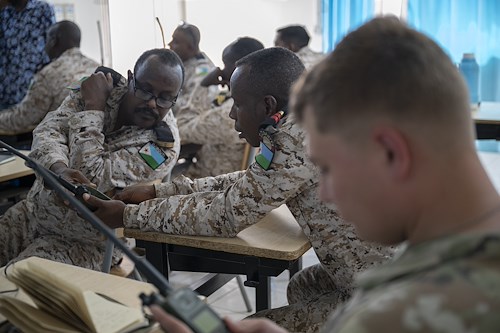Gallery contains 8 images
×
Photo 1 of 8
Ethiopian university, CA team discuss veterinary medicine
The U. Army 404th Civil Affairs Veterinary Cell team traveled to Eastern Ethiopia, June 17-20, 2015, to share knowledge, best practices and learn about their veterinary education; an integral part of developing an agricultural industry that provides food and economic stability to Ethiopia. The members, assigned to Combined Joint Task Force- Horn of Africa, attended the Third International Veterinary Education Conference hosted by the College of Veterinary Medicine at Haramaya University. (U.S. Air Force photo by. Senior Airman Nesha Humes)
Photo by: Senior Airman Nesha Humes
Photo 2 of 8
Ethiopian university, CA team discuss veterinary medicine
U.S. Army Lt. Col. Patricia Rasmussen, 404th Civil Affairs Battalion veterinarian, briefs during the Third International Veterinary Education Conference at Haramaya University in Ethiopia, June 18, 2015. The CA team spoke about maximizing and leveraging veterinary assets to increase capacity in resource limited regions. (U.S. Air Force photo by. Senior Airman Nesha Humes)
Photo by: Senior Airman Nesha Humes
Photo 3 of 8
Ethiopian university, CA team discuss veterinary medicine
U.S. Army Capt. Jodi Collins, left, 404th Civil Affairs Battalion veterinarian, assigned to Combined Joint Task Force- Horn of Africa, feeds a monkey at the Haramaya University Zoo in Dire Dawa, Ethiopia, June 19, 2015. The team attended the Third International Veterinary Education Conference hosted by the HU College of Veterinary Medicine. (U.S. Air Force photo by. Senior Airman Nesha Humes)
Photo by: Senior Airman Nesha Humes
Photo 4 of 8
Ethiopian university, CA team discuss veterinary medicine
The U.S. Army 404th Civil Affairs Battalion Veterinary Cell Team, assigned to Combined Joint Task Force- Horn of Africa, listen to scientific paper presentations at the Third International Veterinary Education Conference at Haramaya University in Dire Dawa, Ethiopia, June 18, 2015. The conference brought together more than 100 East African policy makers, professors, government officials, students and international partners. (U.S. Air Force photo by. Senior Airman Nesha Humes)
Photo by: Senior Airman Nesha Humes
Photo 5 of 8
Ethiopian university, CA team discuss veterinary medicine
The U.S. Army 404th Civil Affairs Battalion Veterinary Cell Team dine during a traditional, Ethiopian coffee break at the Third International Veterinary Education Conference at Haramaya University in Dire Dawa, June 18, 2015. The team, assigned to Combined Joint Task Force- Horn of Africa, met with professors and key leadership to discuss livestock productivity, frequent animal endemic diseases, veterinary education and health food safety. (U.S. Air Force photo by. Senior Airman Nesha Humes)
Photo by: Senior Airman Nesha Humes
Photo 6 of 8
Ethiopian university, CA team discuss veterinary medicine
Hailemariam Kefyalew, left, Haramaya University College of Veterinary Medicine assistant professor gives a campus tour to U.S. Army 404th Civil Affairs Battalion Capt. Jodi Collins, veterinarian and Sgt. Stephanie Taylor, left, veterinary technician, in Dire Dawa, Ethiopia, June 19, 2015. The CA team, assigned to Combined Joint Task Force- Horn of Africa, was invited to attend the Third International Veterinary Education Conference. Established in 2003, CVM houses dairy, beef, poultry, swine, sheep and goat farms for demonstrations and research purposes. (U.S. Air Force photo by. Senior Airman Nesha Humes)
Photo by: Senior Airman Nesha Humes
Photo 7 of 8
Ethiopian university, CA team discuss veterinary medicine
Haramaya University College of Veterinary Medicine hosted the Third International Veterinary Education Conference, in Dire Dawa, Ethiopia, June 18-19th, 2015. The Combined Joint Task Force- Horn of Africa, U.S. Army 404th Civil Affairs Battalion Veterinary Cell Team were invited to attend the conference; it sought to share best practices, experiences, and to improve animal production, productivity and health in the security and safety of food in East Africa. (U.S. Air Force photo by. Senior Airman Nesha Humes)
Photo by: Senior Airman Nesha Humes
Photo 8 of 8
Ethiopian university, CA team discuss veterinary medicine
U.S. Army Lt. Col. Patricia Rasmussen, left, and Capt. Jodi Collins, right, 404th Civil Affairs Battalion veterinarians speak with Hailemariam Kefyalew, Haramaya University College of Veterinary Medicine assistant professor, in Dire Dawa, Ethiopia, June 19, 2015. The veterinarians, assigned to Combined Joint Task Force- Horn of Africa, are the first team to attend the Third International Veterinary Education Conference. (U.S. Air Force photo by. Senior Airman Nesha Humes)
Photo by: Senior Airman Nesha Humes
The U.S. Army's 404th Civil Affairs Battalion veterinary cell team, assigned to Combined Joint Task Force-Horn of Africa, was invited to attend the Third International Veterinary Education Conference at Haramaya University in Ethiopia, June 18-19, 2015.
The three-person team traveled to the fertile, green hillsides of eastern Ethiopia to learn about East African veterinary medical practices, improvement of animal production, productivity, and food health safety and security.
“The focus of this conference is the sustainability of livestock economies.” Capt. Jodi Collins, 404th CA BN veterinarian said. “Oftentimes, people forget the needs of the animals and how they relate to our needs. You can’t address helping the people without helping the livestock and animals we highly depend on. It’s crucial that we have plans in place to address those capabilities.”
The event, hosted by the College of Veterinary Medicine, informed scholars, government officials and the business communities about the impact animal disease and climate change has had on East Africa; in addition to the important factors the animal production markets face.
Dr. Girma Amante, HU president, said sixty-five percent of Ethiopian’s livelihood depends upon the livestock.
“Livestock plays a crucial role in the socio-economic development of the farming community in particular and the country in general,” Amante said.
According to The Cultivating New Frontiers in Agriculture, an international development organization specializing in designing sustainable, market-led agricultural initiatives, Ethiopia ranks in the top eight livestock-producing countries in the world.
“Our government has given special attention to fundamentally transform livestock development,” Abdulaziz Mohamed, Oromia Regional State vice president said. “In order to ensure food security, poverty alleviation and to export the renaissance journey of Ethiopia.”
The two-day conference further discussed animal health service delivery and input supply perspectives; along with the role of veterinary validation in promoting livestock and products of animal origin marketing for food security and sustainable economic growth.
The conference presented a number of challenges and opportunities the livestock sector faces, explained Dr. Yitagele Terefe, HU College of Veterinary Medicine president.
“The evaluation of livestock health provides guidance for policy and decision makers, to assure food security and for sustainable economic development.”
At the conference key leaders and university professors from East Africa taught the veterinarian team about their ability to vaccinate against and respond to foreign animal diseases.
U.S. Army Lt. Col. Patricia Rasmussen, 404th CA BN veterinarian said the conference went well.
“They were really welcoming, our team learned a lot about their capabilities as veterinarians, as a nation, problems they’ve encountered and ways they’ve overcome those issues. It was very enlightening and refreshing.”
The CA team shared a presentation on maximizing and leveraging available veterinary assets in resource-limited regions to increase capacity.
“Their presentation had good information,” Hailemariam Kefyalew, HU College of Veterinary Medicine assistant professor said. “We will see how the U.S. military can work with our communities.”
More than twenty East African scholars shared their findings and held discussion forums.
“I strongly believe that your presence here speaks volumes about your interest and commitment,” Amante said to the attendees, “To promote and improve the livestock sector through inputs, services, education and research.”
Collins said she learned a lot collaborating with our partner nations.
“The conference was great, we look forward to meeting with other veterinarians from other parts of the Horn of Africa and building on the relationships we developed here.”





























